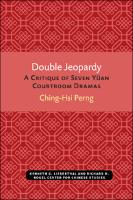Double Jeopardy
A Critique of Seven Yüan Courtroom Dramas
| dc.contributor.author | Perng, Ching-Hsi | |
| dc.contributor.author | Ching-Hsi, Perng | |
| dc.date.accessioned | 2020-09-23T15:16:16Z | |
| dc.date.available | 2020-09-23T15:16:16Z | |
| dc.date.issued | 2020 | |
| dc.identifier | ONIX_20200923_9780472901326_28 | |
| dc.identifier | OCN: 1184508806 | |
| dc.identifier.uri | https://library.oapen.org/handle/20.500.12657/41832 | |
| dc.description.abstract | Traditionally, criticism of plays from the Yüan Dynasty (1260–1368) has been dominated by the so-called poetic and socialist schools. Double Jeopardy instead rigorously evaluates a group of plays by aesthetic criteria generated from within the works themselves. It examines seven courtroom plays with special attention to language and the manipulation of dramatic characters—undoubtedly the most reliable indicators of the playwright’s strength and craftsmanship in such a stylized art form as Yüan tsa-chü drama. The analytical method adopted in Double Jeopardy is textual explication of the conventions of genre and the individual characteristics of each play. The innovation and creative vitality of each playwright emerges through close scrutiny of selected conventional aspects of courtroom dramas: the functions and placement patterns of lyric, verse, and prose as well as the custom of a single singing role and its implication for the presentation of dramatis personae. Because Yüan drama is driven by conventions, Perng demonstrates a method that can be applied not just to judgment reversal plays but to Yüan dramatic criticism as a whole. In pursuing a method of textual explication, Perng provides a basis on which a larger framework of criticism of Yüan drama may be built. | |
| dc.language | English | |
| dc.relation.ispartofseries | Michigan Monographs In Chinese Studies | |
| dc.subject.classification | thema EDItEUR::A The Arts::AG The Arts: treatments and subjects::AGA History of art | en_US |
| dc.subject.other | History of art | |
| dc.title | Double Jeopardy | |
| dc.title.alternative | A Critique of Seven Yüan Courtroom Dramas | |
| dc.type | book | |
| oapen.identifier.doi | 10.3998/mpub.19158 | |
| oapen.relation.isPublishedBy | e07ce9b5-7a46-4096-8f0c-bc1920e3d889 | |
| oapen.relation.isFundedBy | 0314e571-4102-4526-b014-3ed8f2d6750a | |
| oapen.relation.isFundedBy | 0cdc3d7c-5c59-49ed-9dba-ad641acd8fd1 | |
| oapen.imprint | U OF M CENTER FOR CHINESE STUDIES | |
| oapen.series.number | 35 | |
| oapen.pages | 195 | |
| oapen.place.publication | Ann Arbor | |
| oapen.grant.number | [grantnumber unknown] | |
| oapen.grant.number | [grantnumber unknown] | |
| peerreview.anonymity | Double-anonymised | |
| peerreview.id | d98bf225-990a-4ac4-acf4-fd7bf0dfb00c | |
| peerreview.open.review | No | |
| peerreview.publish.responsibility | Scientific or Editorial Board | |
| peerreview.review.decision | Yes | |
| peerreview.review.stage | Pre-publication | |
| peerreview.review.type | Full text | |
| peerreview.reviewer.type | External peer reviewer | |
| oapen.review.comments | The proposal was selected by the acquisitions editor who invited a full manuscript. The full manuscript was reviewed by two external readers using a double-blind process. Based on the acquisitions editor recommendation, the external reviews, and their own analysis, the Executive Committee (Editorial Board) of U-M Press approved the project for publication. |

